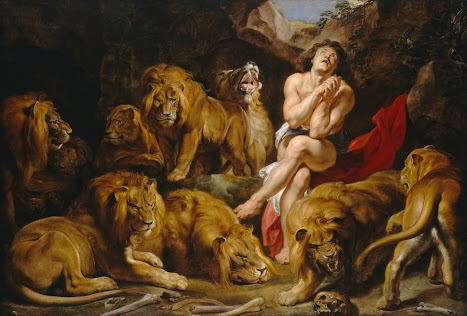As Jesus was walking by the Sea of Galilee, he saw two brothers,
Simon who is called Peter, and his brother Andrew,
casting a net into the sea; they were fishermen.
Andrew had learned from John the Baptist that Jesus was the lamb of God who would take away the sins of the world. He and another disciple immediately left John to follow after this mysterious figure. By the end of his first day with Jesus he was so excited about the one whom he had found that he was overwhelmed by his desire to share this revelation with his brother.
We have found the Messiah (see John 1:41).
Peter, for his own part, was not as easily persuaded as Andrew. Andrew had a posture of readiness and waiting for the Messiah, tuned in, as he was to the voice of the forerunner, John the Baptist. Peter had much else to think about, much that made it difficult for him to be as ready as Andrew. Though they were both fisherman Peter seemed more invested in or dependent upon that identity than Andrew.
Andrew's expectation and readiness to hear bore fruit, not only in himself, but in the way he brought his brother to the Lord. Not all are ready or listening to hear the initial message of our Lord. But many will eventually notice the difference Jesus made in the hearts of those with whom they share life. Our own enthusiasm or excitement will not of itself convert anyone. But it may be part of what God uses to persuade others to give Jesus a chance.
At once they left their nets and followed him.
At once isn't always the whole story. There was certainly some level of natural preparation for Peter before he made this decision. Yet he did finally arrive at a decision that was decisive, a fundamental break with his former identity, symbolized by his leaving his nets, in order to receive a new identity as a follower of Jesus. Thank goodness for Andrew, through whom God worked to bring this about. Thank goodness for all of those still acting as fishers of men in our own world.
How beautiful are the feet of those who bring the good news!
May Saint Andrew teach us by his prayers how to be witnesses ourselves, witnesses who are patient and present with those who have thus far been slower to see what we have found in Jesus.
If you confess with your mouth that Jesus is Lord
and believe in your heart that God raised him from the dead,
you will be saved.
The message is so good as to seem foolish. Much worldly cynicism puts us on guard against anything that seems too good to be true. But Jesus is actually better than anything we could imagine ourselves, more than we would even dare to ask. He has demonstrated the validated of his claim not only by his miracles, including his resurrection, but also by what he has done in the hearts of his witnesses. When hard, cynical, worldly people are willing to leave behind all that have been before in order to follow Jesus this is surely miraculous.
The call is not merely to learn a teaching, which would be easy and could fit comfortably into the context of a normal life without any real change to business as usual. It is rather riskier and more demanding. The call is the follow a person. Jesus did not call people who would be especially skilled in doctrine. He called people whom he knew could become convincing witnesses. He desires to make us convincing witnesses as well. For Peter, this didn't come from his skill in fishing, but from his time with the Lord. For us too time with the Lord is key to becoming witnesses who not only offer abstractions but whose very lives are the evidence through which Jesus reaches out to others.
May Saint Andrew intercede for us that we will be ready to let other people know what we have found in the lamb of God, to not be ashamed to show our excitement in finally having found the Messiah for whom every human heart longs. Saint Andrew, pray for us!












